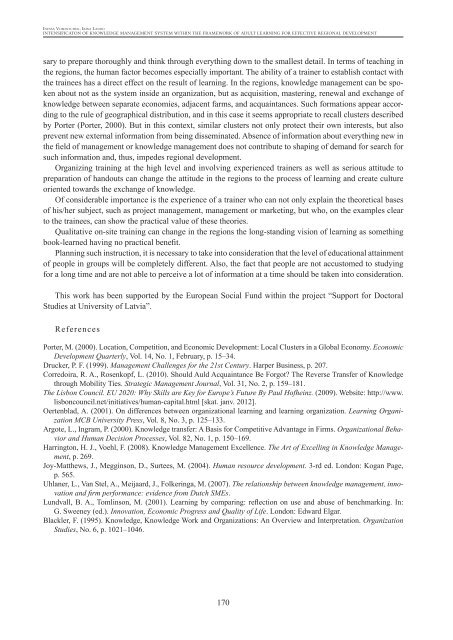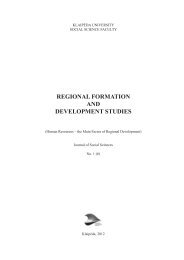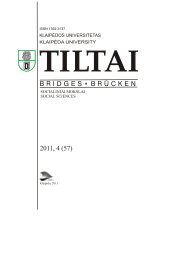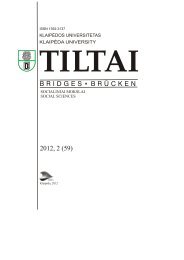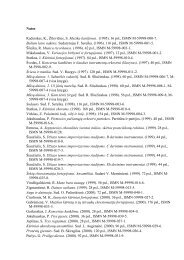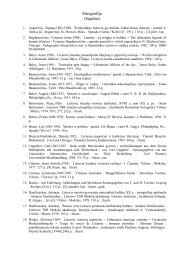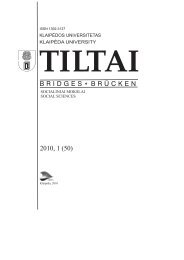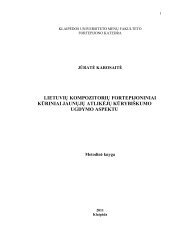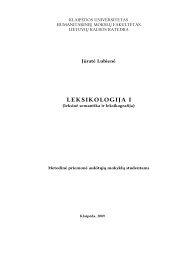regional formation and development studies - KlaipÄdos universitetas
regional formation and development studies - KlaipÄdos universitetas
regional formation and development studies - KlaipÄdos universitetas
You also want an ePaper? Increase the reach of your titles
YUMPU automatically turns print PDFs into web optimized ePapers that Google loves.
Inessa Vorontchuk, Irina L<strong>and</strong>o<br />
INTENSIFICATON OF KNOWLEDGE MANAGEMENT SYSTEM WITHIN THE FRAMEWORK OF ADULT LEARNING FOR EFFECTIVE REGIONAL DEVELOPMENT<br />
sary to prepare thoroughly <strong>and</strong> think through everything down to the smallest detail. In terms of teaching in<br />
the regions, the human factor becomes especially important. The ability of a trainer to establish contact with<br />
the trainees has a direct effect on the result of learning. In the regions, knowledge management can be spoken<br />
about not as the system inside an organization, but as acquisition, mastering, renewal <strong>and</strong> exchange of<br />
knowledge between separate economies, adjacent farms, <strong>and</strong> acquaintances. Such <strong>formation</strong>s appear according<br />
to the rule of geographical distribution, <strong>and</strong> in this case it seems appropriate to recall clusters described<br />
by Porter (Porter, 2000). But in this context, similar clusters not only protect their own interests, but also<br />
prevent new external in<strong>formation</strong> from being disseminated. Absence of in<strong>formation</strong> about everything new in<br />
the field of management or knowledge management does not contribute to shaping of dem<strong>and</strong> for search for<br />
such in<strong>formation</strong> <strong>and</strong>, thus, impedes <strong>regional</strong> <strong>development</strong>.<br />
Organizing training at the high level <strong>and</strong> involving experienced trainers as well as serious attitude to<br />
preparation of h<strong>and</strong>outs can change the attitude in the regions to the process of learning <strong>and</strong> create culture<br />
oriented towards the exchange of knowledge.<br />
Of considerable importance is the experience of a trainer who can not only explain the theoretical bases<br />
of his/her subject, such as project management, management or marketing, but who, on the examples clear<br />
to the trainees, can show the practical value of these theories.<br />
Qualitative on-site training can change in the regions the long-st<strong>and</strong>ing vision of learning as something<br />
book-learned having no practical benefit.<br />
Planning such instruction, it is necessary to take into consideration that the level of educational attainment<br />
of people in groups will be completely different. Also, the fact that people are not accustomed to studying<br />
for a long time <strong>and</strong> are not able to perceive a lot of in<strong>formation</strong> at a time should be taken into consideration.<br />
This work has been supported by the European Social Fund within the project “Support for Doctoral<br />
Studies at University of Latvia”.<br />
References<br />
Porter, M. (2000). Location, Competition, <strong>and</strong> Economic Development: Local Clusters in a Global Economy. Economic<br />
Development Quarterly, Vol. 14, No. 1, February, p. 15–34.<br />
Drucker, P. F. (1999). Management Challenges for the 21st Century. Harper Business, p. 207.<br />
Corredoira, R. A., Rosenkopf, L. (2010). Should Auld Acquaintance Be Forgot? The Reverse Transfer of Knowledge<br />
through Mobility Ties. Strategic Management Journal, Vol. 31, No. 2, p. 159–181.<br />
The Lisbon Council. EU 2020: Why Skills are Key for Europe’s Future By Paul Hofheinz. (2009). Website: http://www.<br />
lisboncouncil.net/initiatives/human-capital.html [skat. janv. 2012].<br />
Oertenblad, A. (2001). On differences between organizational learning <strong>and</strong> learning organization. Learning Organization<br />
MCB University Press, Vol. 8, No. 3, p. 125–133.<br />
Argote, L., Ingram, P. (2000). Knowledge transfer: A Basis for Competitive Advantage in Firms. Organizational Behavior<br />
<strong>and</strong> Human Decision Processes, Vol. 82, No. 1, p. 150–169.<br />
Harrington, H. J., Voehl, F. (2008). Knowledge Management Excellence. The Art of Excelling in Knowledge Management,<br />
p. 269.<br />
Joy-Matthews, J., Megginson, D., Surtees, M. (2004). Human resource <strong>development</strong>. 3-rd ed. London: Kogan Page,<br />
p. 565.<br />
Uhlaner, L., Van Stel, A., Meijaard, J., Folkeringa, M. (2007). The relationship between knowledge management, innovation<br />
<strong>and</strong> firm performance: evidence from Dutch SMEs.<br />
Lundvall, B. A., Tomlinson, M. (2001). Learning by comparing: reflection on use <strong>and</strong> abuse of benchmarking. In:<br />
G. Sweeney (ed.). Innovation, Economic Progress <strong>and</strong> Quality of Life. London: Edward Elgar.<br />
Blackler, F. (1995). Knowledge, Knowledge Work <strong>and</strong> Organizations: An Overview <strong>and</strong> Interpretation. Organization<br />
Studies, No. 6, p. 1021–1046.<br />
170


